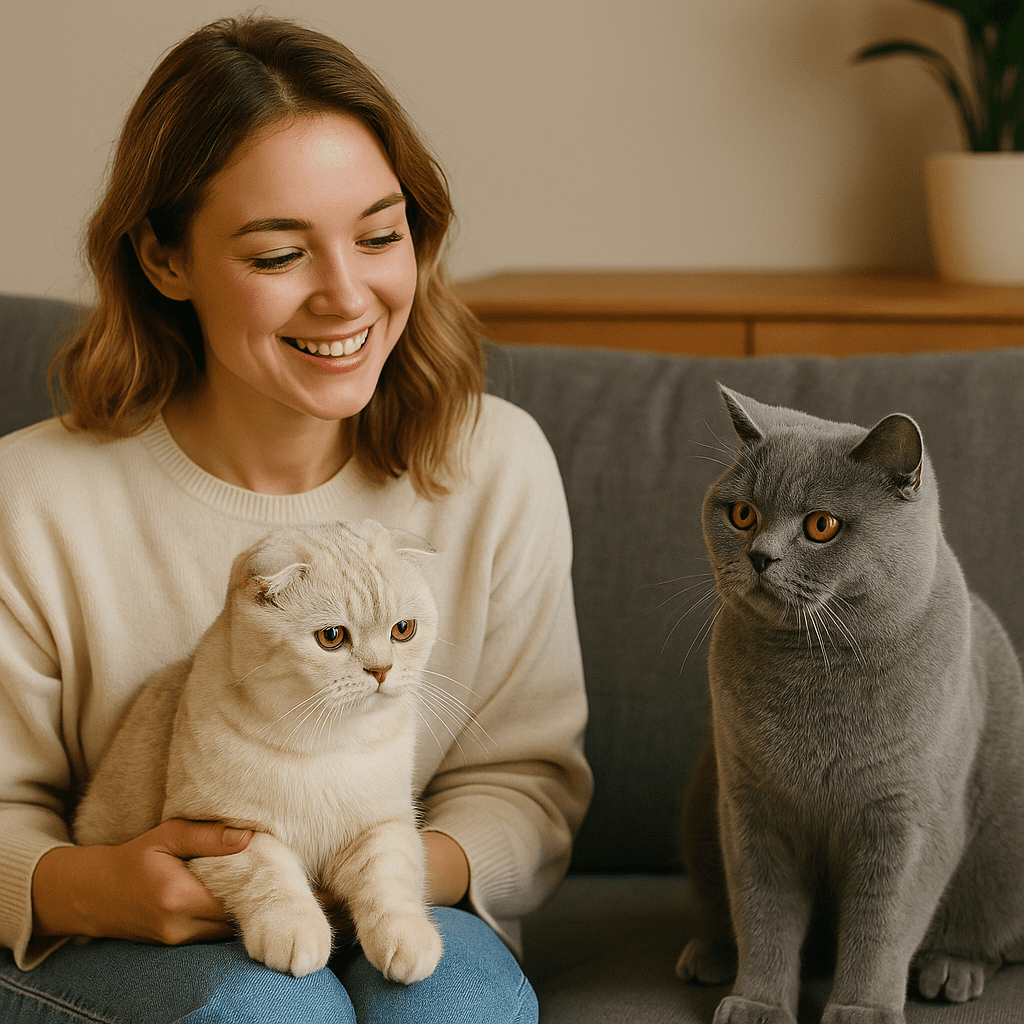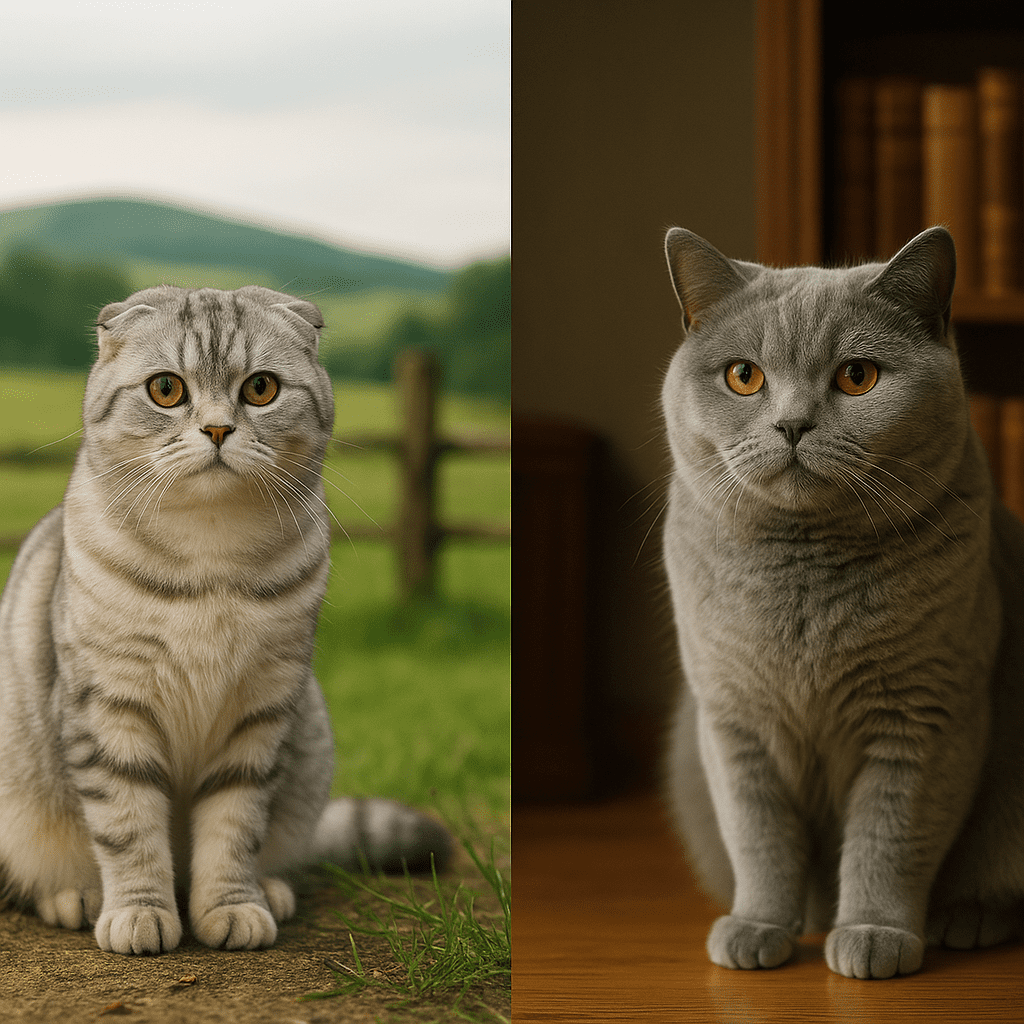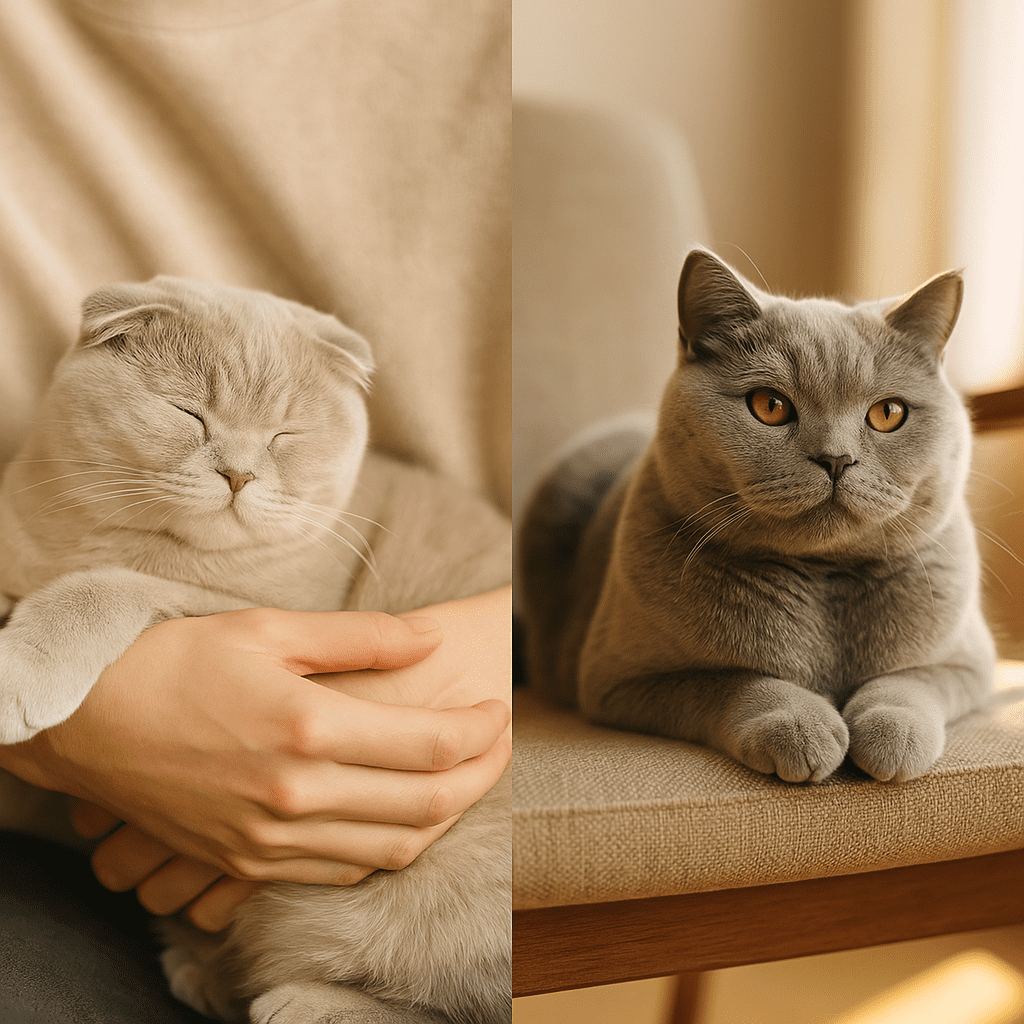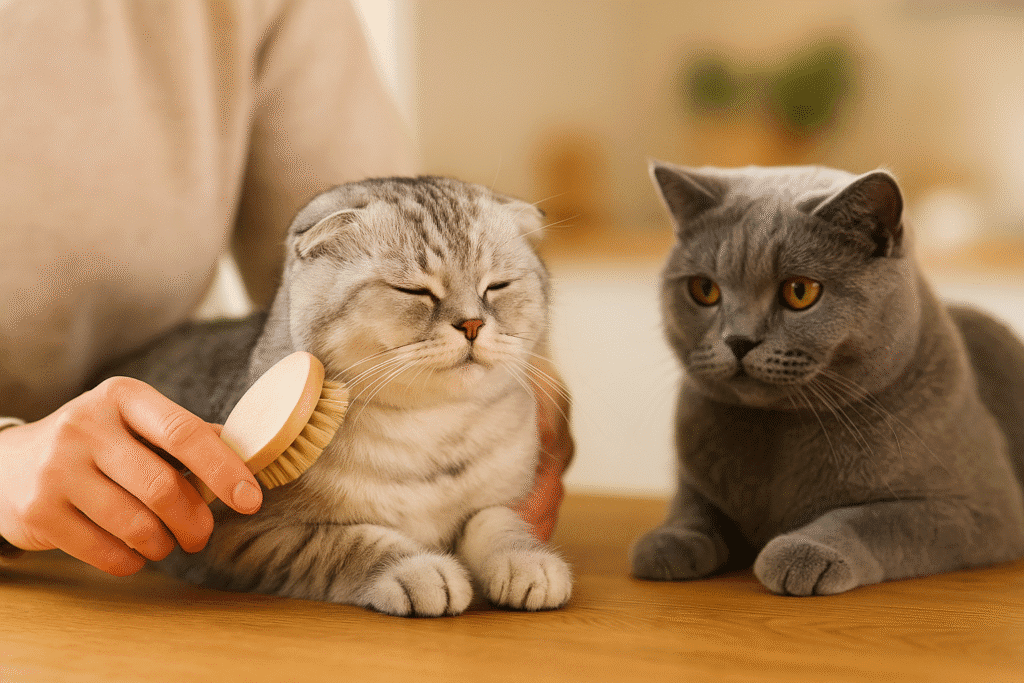Choosing between the Scottish Fold and British Shorthair can be tough — both are gentle, affectionate, and low-maintenance cats. This guide compares their temperament, grooming needs, health, and lifestyle compatibility to help you find the perfect calm feline companion for your home.

Introduction: The Battle of Calm and Cuddly Companions
When it comes to calm, affectionate cats, the Scottish Fold and British Shorthair stand among the most beloved breeds in the world. Their sweet personalities and plush appearances make them ideal companions for quiet homes. However, while both breeds share a gentle nature, they differ in origin, appearance, and specific care needs.
In this Scottish Fold vs British Shorthair Care Guide, you’ll learn everything about their temperament, grooming, health, and lifestyle preferences to help you decide which one is your perfect match.
Breed Origins and History
Scottish Fold: The Adorable Cat with Folded Ears
The Scottish Fold originated in Scotland in the 1960s, known for its signature folded ears caused by a natural gene mutation. These cats quickly gained popularity due to their owl-like faces and affectionate demeanor. They are medium-sized, round-faced, and have plush coats that come in many colors and patterns.
British Shorthair: The Classic British Icon
The British Shorthair is one of the oldest and most cherished breeds in the UK. Descending from Roman cats brought to Britain, they evolved into a sturdy, muscular, and calm breed known for their resilience and plush “teddy bear” coats. The most iconic color variation is the solid blue, often referred to as the “British Blue.”

Personality and Temperament
Scottish Fold Personality: Sweet and Quiet
The Scottish Fold is known for its soft voice, calm nature, and deep affection for family. They thrive on companionship and are often described as “lap cats.” They adapt well to indoor life, making them perfect for apartments or quiet homes. However, they dislike being left alone for long hours.
British Shorthair Personality: Independent but Loving
The British Shorthair is independent, intelligent, and dignified. They enjoy being near their humans but don’t demand constant attention. Their relaxed temperament makes them one of the best breeds for busy owners or families with children. They’re playful in kittenhood but mellow as adults, often preferring naps in sunny spots.
Physical Characteristics: Spotting the Differences
- Head and Face: Scottish Folds have rounded heads and forward-folded ears, while British Shorthairs have larger round heads with upright ears.
- Eyes: Both breeds have large, round eyes — but Folds often appear more “owl-like.”
- Body Type: British Shorthairs are more muscular and stocky; Scottish Folds are softer and more flexible.
- Coat Texture: Both have dense, plush coats, but the British Shorthair’s fur is thicker and shorter.
Grooming and Maintenance Needs
Scottish Fold Grooming Tips
The Scottish Fold requires weekly brushing to remove loose fur and reduce shedding. Long-haired variants (Scottish Fold Longhair) need more frequent grooming. Regular ear cleaning is crucial due to the folded structure, which can trap wax and moisture.
British Shorthair Grooming Tips
British Shorthairs have dense coats that benefit from weekly brushing. During shedding seasons (spring and fall), brushing twice a week helps manage fur. They generally stay clean, needing baths only occasionally.

Health and Common Issues
Scottish Fold Health Concerns
The most notable issue in Scottish Folds is osteochondrodysplasia, a genetic condition affecting cartilage and bone development. It can cause stiffness and pain in the tail, legs, or joints. Responsible breeding practices and regular vet checkups help reduce risks.
British Shorthair Health Concerns
British Shorthairs are generally robust but prone to obesity and heart disease (hypertrophic cardiomyopathy). Maintaining a balanced diet and encouraging moderate exercise helps prevent these problems.
Exercise and Activity Levels
Both breeds are moderate in activity. Scottish Folds enjoy interactive play sessions and puzzle toys that stimulate their intelligence. British Shorthairs prefer short bursts of play followed by long naps — they’re not overly energetic but still benefit from daily engagement.
Diet and Nutrition Tips
A balanced diet rich in high-quality protein supports both breeds. Avoid excessive treats and monitor portion sizes, as both breeds are prone to weight gain. Wet food helps maintain hydration, especially in indoor cats.
Training and Socialization
Scottish Folds are easy to train with positive reinforcement. They enjoy routines and gentle encouragement. British Shorthairs, while independent, also respond well to consistent training and early socialization. Both breeds are friendly with children and other pets when introduced properly.
Lifespan and Living Environment
Both breeds have a lifespan of 12–15 years with proper care. They adapt well to indoor environments, preferring calm, stable homes. Ensure they have cozy resting spots and window perches to watch the world outside.
Which Breed Should You Choose?
Choose the Scottish Fold if you want an affectionate lap cat who craves attention and enjoys constant companionship. Choose the British Shorthair if you prefer a more independent, low-maintenance cat that still shows loyalty and affection on its own terms.
Conclusion: Two Calm Companions, One Perfect Match for You
Both breeds represent the best of calm and loving feline companionship. Whether you’re drawn to the sweet-natured Scottish Fold or the classic charm of the British Shorthair, you can’t go wrong. Understanding their personalities and needs ensures a lifelong bond filled with love and comfort.
Internal & External Resources
- Internal link: British Shorthair Cats: Personality & Care Guide
- Internal link: Scottish Fold Cat Care Guide: Personality, Health & Grooming
- Outbound link: Aurora Veterinary Hospital — Best Breeds for a House Cat

FAQ – Scottish Fold vs British Shorthair
1. Are Scottish Folds more affectionate than British Shorthairs?
Yes, Scottish Folds tend to be more attached and people-oriented, while British Shorthairs are loving but independent.
2. Do both breeds get along with children?
Absolutely. Both breeds are known for their patience and gentle temperaments, making them ideal family pets.
3. Which cat is easier to groom?
The British Shorthair requires slightly less grooming than the longhaired version of the Scottish Fold.
4. Are Scottish Folds healthy cats?
They can be, but only when bred responsibly. Always choose breeders who screen for joint and cartilage issues.
5. Do either of these breeds like to be alone?
British Shorthairs handle solitude better, while Scottish Folds prefer companionship and human interaction.
CTA – Explore More Cat Breed Guides
Looking for your next feline friend? Check out our Complete Cat Breed Guides for more insights and care tips!

